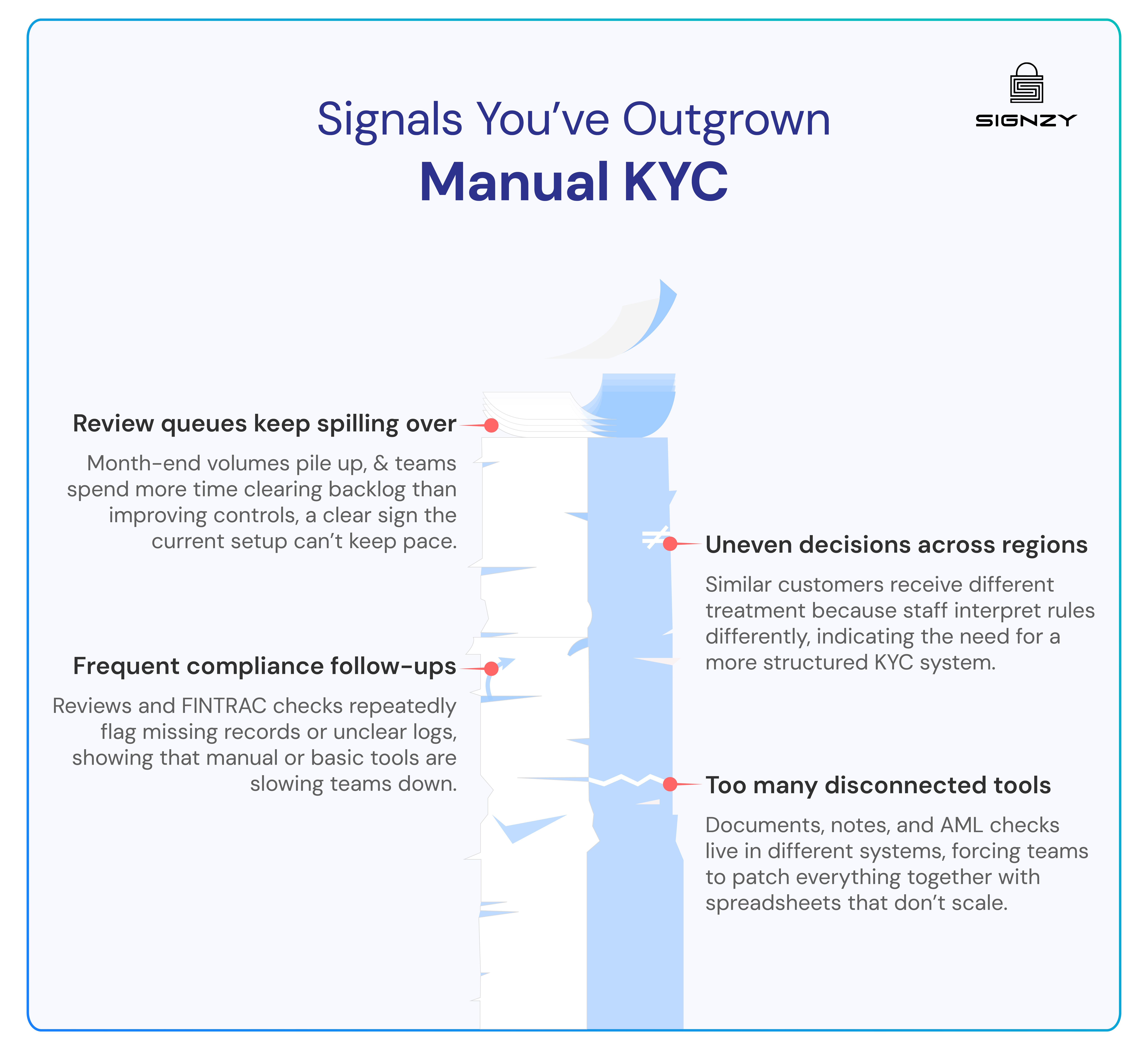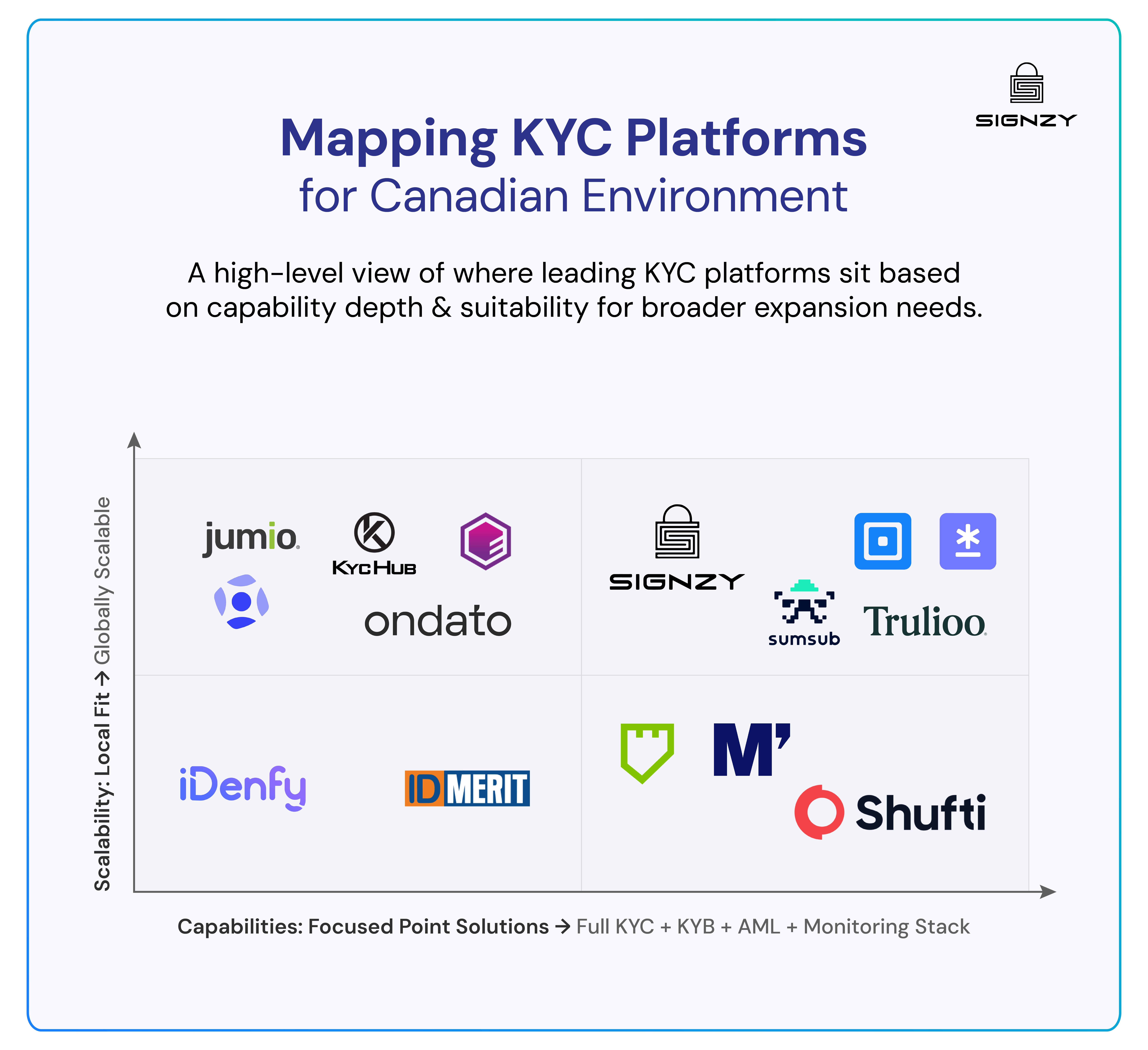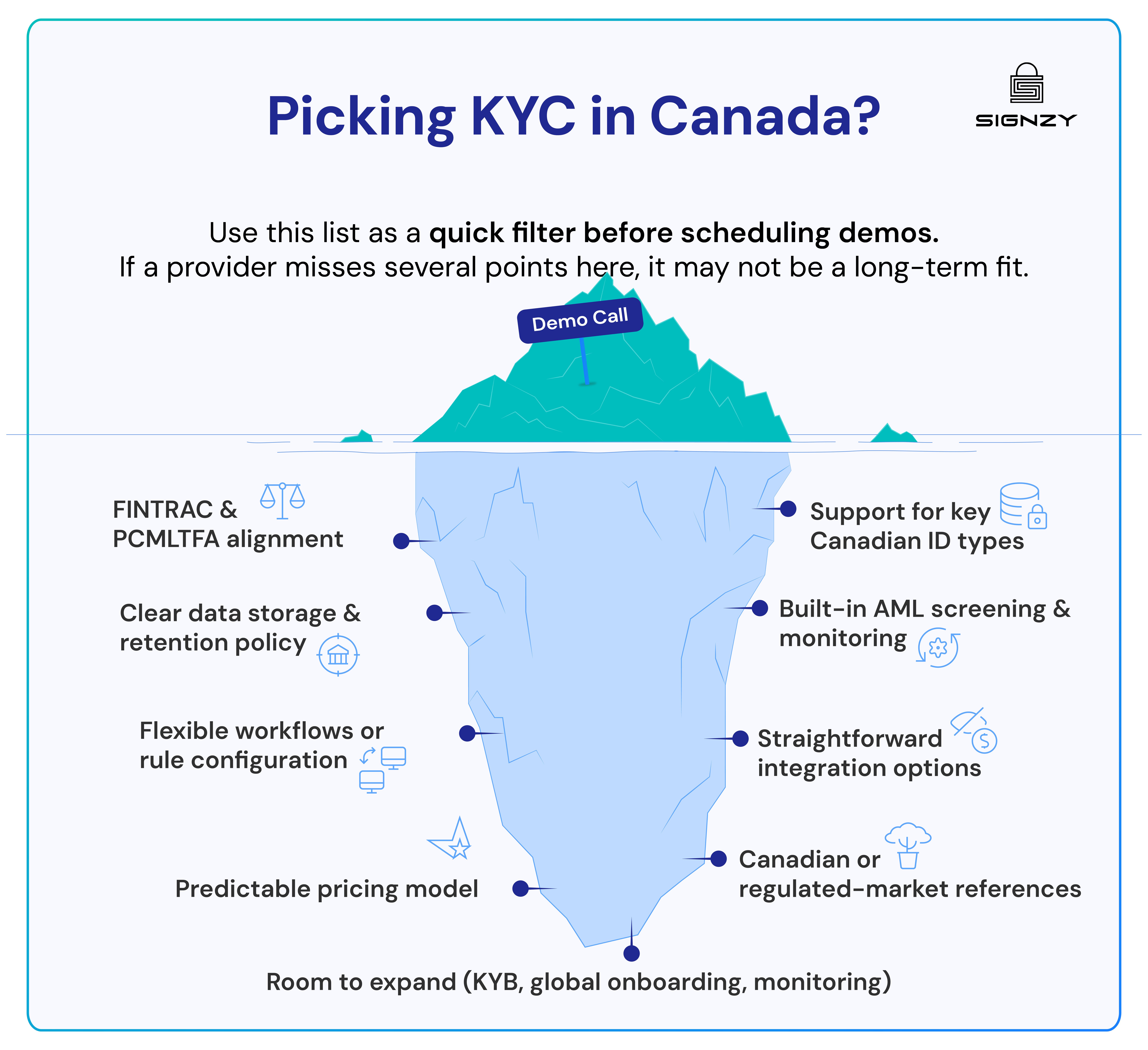12 Best KYC Verification Solutions in Canada (2026 Guide)
Canadian businesses face a unique KYC challenge: serving customers from Newfoundland to British Columbia means dealing with 13 different provincial and territorial ID systems, two official languages, and some of the world's strictest privacy regulations.
In practice, these layers make KYC verification ops a bit complex: mismatched ID formats, incomplete information, and verification steps that vary depending on where a customer lives. This is where dependable KYC verification plays a real role.
While there are hundreds available in the market, we've shortlisted 12 of the best KYC verification after 2 weeks of research and discussions with experts (more on this in the "methodology" section). Below, we will dig deep into all of them.
Related Solutions
With that said, let's look at what sets each apart.
| Provider | Primary Strength | Why It’s Useful in Canada |
|---|---|---|
| Signzy | AI-driven digital identity verification. global coverage. | One of the most cost-efficient solutions for Canadian and global institutions needing fast, automated verification with a strong focus on workflow efficiency. Coverage spans 180+ countries. |
| Trulioo | KYC + KYB at scale | Strong FINTRAC-aligned resources and broad registry coverage for cross-border onboarding. |
| Jumio | Mature enterprise-grade verification | Preferred by regulated institutions needing established vendor history and strong fraud tools. |
| Onfido / Entrust | Mobile-first capture + security layer | Suitable for Canadian banks and fintechs wanting reliable biometric flows and enterprise identity architecture. |
| Persona | Flexible KYC and KYB workflows | Useful when onboarding needs differ across products or regions, or adaptable AML rules are required. |
| iDenfy | Hybrid fraud-focused model | Helps Canadian gaming, crypto, and gig platforms reduce manipulated ID attempts. |
| Sumsub | Non-doc KYC for Canada | High Canadian match rates and a full AML suite, strong for conversion-sensitive products. |
| Ondato | Privacy-aware compliance workflows | Appeals to regulated teams that need structured reviews and PIPEDA-conscious processes. |
| Shufti Pro | Broad global document coverage | Works well for Canadian companies onboarding users from many regions. |
| KYC Hub | Compliance hub + monitoring | Useful for Canadian MSBs and fintechs needing ongoing AML and workflow management. |
| PassFort (Moody’s) | Policy + workflow orchestration | Strong for complex Canadian due diligence processes tied to Moody's data. |
| ComplyCube | Developer-friendly + modular | Good fit for Canadian fintechs that need adaptable workflows and straightforward APIs. |
| IDMERIT | Telecom + data-driven checks | Useful when you want flexible, data-heavy verification behind your own onboarding flow. |
What is a KYC Verification Solution?
KYC verification solution (or software) is used by financial institutions, fintechs, marketplaces, and other regulated businesses to confirm the identity of customers before they are allowed to use a service. It typically brings together document checks, biometric analysis, database lookups, sanctions screening, and other forms of user validation.
The goal is to meet regulatory requirements while keeping onboarding smooth for real users. A solid KYC flow usually follows a simple pattern: ID OCR, optional database validation, face match or liveness, and AML and watchlist screening. Most tools also support ongoing monitoring since Canadian AML rules expect businesses to review customers over time rather than rely on a single check.

For organizations expanding beyond Canada, these systems also offer standardized checks across multiple countries so that compliance teams are not reinventing processes market by market.
How Can KYC Verification Solutions Benefit Canadian Businesses
Using a dedicated platform avoids many of the manual steps that used to slow down onboarding. It also helps organizations standardize their due diligence approach rather than depending on ad-hoc reviews.
Below are some of the most meaningful advantages of adopting a modern system.
↪ Better regulatory alignment
Automated controls help teams apply Canadian KYC and AML rules consistently. Many platforms include policy templates, risk scoring tools, and monitoring features that reduce gaps in compliance procedures.
↪ Improved fraud detection
Identity verification software cross-checks documents, biometrics, and data sources in ways that manual teams cannot scale. This results in fewer fraudulent accounts and reduces operational losses.
↪ Faster onboarding for legitimate users
Good systems streamline data capture, minimize back-and-forth communication, and let users verify themselves in minutes. For Canadian businesses competing with global products, this speed has a measurable impact on conversion.
↪ Operational efficiency
Compliance teams can focus on exceptions rather than checking every user. Case management, audits, and reporting tools also make it easier to prepare for FINTRAC reviews and internal risk assessments.
A well-chosen KYC solution becomes a long-term operational asset rather than a temporary regulatory requirement, especially as organizations scale beyond their initial markets.
Methodology: Best KYC Verification Solutions in Canada
Selecting a KYC provider can feel straightforward on the surface, but the nuances matter, especially for Canadian businesses that must follow FINTRAC and PCMLTFA requirements.

I approached this list by focusing on what actually impacts day-to-day compliance work rather than relying on generic global rankings.
When evaluating each platform, you should consider several areas that influence both accuracy and long-term usability:
- Regulatory alignment: How well the service supports FINTRAC expectations, including guidance, workflow controls, and audit-ready outputs.
- Canadian document and data coverage: Support for passports, driver’s licences, and any Canadian data sources that improve match confidence.
- AML screening depth: Quality of sanctions, PEP, and adverse-media checks, plus whether ongoing monitoring fits Canadian reporting requirements.
- Scalability: Ability to handle Canadian onboarding today and international users as your product grows.
- Fraud-control capability: Performance of document analysis, biometrics, and liveness detection in real-world scenarios.
- Integration experience: API usability, SDK quality, and how manageable the system is for your developers over time.
- Pricing structure: Transparency around fees and whether pricing scales sensibly with your onboarding volume.
By applying these criteria, we got a clearer view of which solutions will work reliably in Canadian compliance settings rather than relying solely on feature lists or vendor claims.
1. Signzy
Signzy has been working in digital onboarding and KYC since 2015, with a few hundred people across engineering, compliance, data science and delivery. Canada is one of the regions where we’ve spent time building flows that line up with FINTRAC expectations, provincial ID formats and the privacy standards Canadian financial institutions are held to.
The platform is used in more than 180 countries, but our Canadian setup has its own verification rules, data-handling guardrails and AML checks to match local requirements.
Alongside KYC, we support KYB verification and AML screening for businesses operating in Canada, which helps banks, fintechs and credit unions validate corporate information without juggling multiple tools. Plus, Signzy lets you integrate many functions as you scale:
- AI-driven document processing
- OCR
- Biometric authentication
- Liveness
- AML screening
- Workflow automation
One-Touch KYC, our low-friction onboarding framework, was highlighted by Gartner for the way it reduces steps without weakening verification.
As of December 2025, Signzy now serves more than 500 clients worldwide, including over ten from the Fortune 30, and our work in Canada includes partnerships like ASAPP Financial Technology for remote identification and branchless onboarding.
“The One Touch KYC solution brings robust compliance and advanced fraud prevention that will greatly benefit our banking and credit union Client-Partners. Together, we’re setting a new standard for secure and seamless digital onboarding experiences in Canada and beyond.” — Steve Sauve, Chief Product Officer, ASAPP Financial Technology.
“The integration with the Signzy was very easy, as an insurtech platform we are using a couple of API services in our digital platform to smoothen the journey and the data which we got through api are very authenticated and correct and response of apis are quite fast.” — Amit S., Product Manager at enterprise with 1000+ employees, G2 Verified Review
Signzy - Pros and cons
| Pros | Cons |
|---|---|
| Strong automation with AI, OCR, and liveness checks - good for fast onboarding and fraud mitigation | Pricing and contract terms may be geared toward larger volumes; smaller Canadian firms will need to clarify minimums. |
| They explicitly address Canadian business verification workflows and data residency concerns. | |
| Global platform that can scale if your business grows beyond Canada |
Signzy - Pricing
One of the most economical yet comprehensive solutions in the market. Exact pricing is available upon contact as the quote depends on the volume of verifications and mix of features (document + biometrics + AML screening + business verification) you want. Book a demo here to get a quote.
When to pick Signzy
- You’re operating in Canada but foresee international user growth and want one vendor that scales.
- Speed of onboarding and high-volume verification are important.
- You need strong automation (OCR, liveness, AI) and want to reduce manual back-office burden.
- You’re comfortable working with a vendor that is global but has Canadian relevance (with attention to data residency and local compliance).
- You want built-in checks for Canadian business identifiers, including GST/HST number verification, so you can validate suppliers and partners during expansion.
Related Blogs
2. Trulioo
Trulioo has been part of the Canadian identity ecosystem for more than a decade, and its Vancouver roots shape a lot of how the product fits into local compliance expectations. The company has grown into a large identity and business-verification network, pulling data from hundreds of international sources, corporate registries, and government datasets.
What makes Trulioo relevant for Canadian teams is its long-standing work around FINTRAC identification rules and remote onboarding guidance, which helps risk and compliance functions build policies with fewer gaps.
Trulioo - Pros and cons
| Pros | Cons |
|---|---|
| FINTRAC-specific guidance and PCMLTFA content are useful for compliance teams. | Overkill for very simple or low-volume products |
| Strong KYB and business registry coverage, helpful for MSBs and B2B fintech | Implementation and integration need dedicated engineering time |
| Global reach fits Canadian companies with U.S. or EU customers | Pricing aimed at mid-market and enterprise, rather than micro-startups |
Trulioo - Pricing
Available upon contact.
When to pick Trulioo
- You need one provider for both Canadian and international onboarding.
- Business verification and UBO checks are part of your core flow.
- Compliance wants a vendor that talks explicitly about FINTRAC and PCMLTFA.
3. Jumio
Jumio supports Canadian driver’s licences, passports, and other IDs. The company has been around for more than a decade and has processed over a billion transactions across 200+ countries and territories.
For Canadian institutions that prefer large vendors with proven scale and strong ties to global regulators, Jumio can be one of the best KYC verification software picks.
Jumio - Pros and cons
| Pros | Cons |
|---|---|
| Canada-specific messaging and PCMLTFA alignment are useful for compliance | Price points can be high for smaller Canadian startups |
| Supports a wide range of Canadian and international documents | Projects require structured implementation and change control |
| Widely recognized by regulators and industry groups |
Jumio - Pricing
Available upon contact.
When to pick Jumio
- You are a regulated Canadian institution that needs a large, proven vendor.
- Your risk team wants strong fraud analytics on top of KYC.
- You expect detailed scrutiny from FINTRAC or other regulators and want a familiar name.
4. Onfido (Entrust)
Onfido, now part of Entrust, underpins a number of Canadian digital ID flows, including Capital One Canada’s digital ID verification process that references Onfido to meet Canadian KYC obligations.
Entrust itself offers an AI-powered KYC solution for Canada that uses ID capture and facial biometrics to help organizations meet FINTRAC requirements, with results available via API or dashboard and flexible, no-code workflow tools. This combination makes the Onfido/Entrust stack attractive for Canadian banks and fintechs that want good mobile UX plus an enterprise-grade identity and security layer.
Read More: Signzy vs Onfido
Onfido - Pros and cons
| Pros | Cons |
|---|---|
| Used in Canadian financial products like Capital One’s digital ID flows | The product roadmap is now tied to Entrust's broader strategy |
| Entrust KYC for Canada is explicitly aligned with FINTRAC expectations | Some smaller customers may find enterprise orientation too heavy |
| SOC 2 and ISO 27001 certifications are helpful in Canadian vendor assessments |
Onfido - Pricing
Available upon contact.
When to pick Onfido / Entrust
- You need mobile-friendly onboarding flows for Canadian customers.
- FINTRAC-oriented KYC must sit inside a broader identity and security strategy.
- Your procurement and security teams prefer certified, enterprise-grade vendors.
5. Persona
Persona provides a verification platform that brings identity checks, document analysis, biometrics, AML screening and KYB capabilities into one system. The product is designed around modular components that can be combined or adjusted depending on what a business needs for its onboarding or risk review flows.
For Canada, public information shows support for both English and Canadian French interfaces, along with verification flows that can be aligned with federal KYC and PCMLTFA requirements.
Persona - Pros and Cons
| Pros | Cons |
|---|---|
| Supports both KYC and KYB workflows in one platform | More configuration effort than template-based systems |
| Offers English and Canadian French interfaces | Canada-specific data connections are limited |
| Broad set of verification methods and workflow controls |
Persona - Pricing
Available upon contact.
When to Pick Persona
- You need both KYC and KYB within one system
- You change verification steps often
- Your workflows require several verification components in combination
6. iDenfy
iDenfy markets primarily as a fraud-focused KYC provider with global coverage, and that includes support for Canadian passports, driver’s licences, and national IDs among thousands of document types.
For Canadian use cases, its value shows up most in sectors such as crypto, iGaming, and gig platforms, where identity fraud and chargebacks are real operational costs. iDenfy routes suspicious or unclear cases to human analysts, which often suits Canadian operators who want a more conservative stance around high-risk patterns but do not want to build their own manual review teams.
iDenfy - Pros and cons
| Pros | Cons |
|---|---|
| Supports Canadian ID documents as part of a 200+ country library | Less visible in the traditional Canadian banking segment |
| Hybrid AI + human review improves accuracy in fraud-heavy funnels | Not a full AML or transaction monitoring platform |
| Easy plugin and API options for smaller teams |
iDenfy - Pricing
Available upon contact, but the "human-in-the-loop" tier is likely to be pricier than rivals.
When to pick iDenfy
- You operate in a sector where Canadian regulators worry about fraud and chargebacks.
- You want human review for edge cases without building a large internal KYC team.
- Compliance is important, but fraud outcomes drive most of your decisions.
7. Sumsub
Sumsub offers a Canada Non-Doc Verification product that can verify over 80% of the adult population using regulated data sources like credit, banking, and telecom records, while staying fully compliant with FINTRAC guidelines.
On top of this, Sumsub provides document KYC, KYB, sanctions, and PEP screening, and transaction monitoring in one system. For teams that want to design a risk-based approach aligned with Canadian AML law and still support international onboarding, Sumsub can be a good fit. It gives a mix of local regulatory fit, high coverage of the Canadian population, and enough product breadth to handle future international expansion.
Sumsub - Pros and cons
| Pros | Cons |
|---|---|
| Canada Non-Doc Verification is a strong local differentiator | The platform can be more complex than needed for single-country small apps |
| FINTRAC-focused guidance helps compliance teams align controls | Implementation effort is real if you activate monitoring and analytics |
| Good reputation in crypto and high-growth fintech | May be too heavy for low-risk, low-volume Canadian businesses |
Sumsub - Pricing
Available upon contact (annual or multi-year contracts).
When to pick Sumsub
- You want high-conversion, FINTRAC-compliant onboarding in Canada plus global support.
- Transaction monitoring and risk-based AML are part of your roadmap.
- Your organization expects to work with regulators and auditors beyond Canada.
8. Ondato
Ondato’s relevance to Canada comes from its focus on regulation-aware KYC and AML processes and its explicit coverage of Canadian privacy law topics. They publish guidance on PIPEDA and cross-border data topics, which Canadian compliance teams can use when they are mapping out third-party risk and data-processing agreements.
The company offers KYC, KYB, AML screening, age verification, and transaction monitoring, and it reports coverage in 190+ countries with tens of millions of onboarded users. For Canadian financial firms that want a mid-sized partner rather than a very large U.S. vendor, Ondato can be an attractive compromise.
Ondato - Pros and cons
| Pros | Cons |
|---|---|
| Addresses PIPEDA and privacy topics in its content and tooling | Fewer Canadian customer references compared with Signzy or Jumio |
| Workflow-oriented approach suited to regulated entities | Stronger presence in Europe than in North America |
| Mid-sized vendor; easier to get attention than from very large providers |
Ondato - Pricing
Available upon contact.
When to pick Ondato
- You want a workflow-focused compliance tool and not just a document scanner.
- Privacy and PIPEDA discussions are central to your vendor selection.
- A mid-sized partner feels more workable than a very large global enterprise.
9. Shufti Pro
Shufti Pro runs a dedicated “KYC for Canada” offering that promises real-time identity verification and AML screening for Canadian customers. They support Canadian ID documents, run risk checks against international watchlists, and have content specifically aimed at explaining KYC and AML obligations for Canadian sectors such as banking, iGaming, and fintech.
Shufti Pro’s pitch is largely about speed and reach: automated checks across more than 230 countries and territories, making it attractive for Canadian companies with significant non-Canadian traffic.
Shufti Pro - Pros and cons
| Pros | Cons |
|---|---|
| Dedicated Canadian KYC landing pages and whitepapers | Not as entrenched in Tier-1 Canadian banks as some rivals |
| Wide country and document coverage for cross-border operations | Platform UX is more utilitarian than premium |
| Strong iGaming and forex use cases relevant to Canadian operators |
Shufti Pro - Pricing
Available upon contact.
When to pick Shufti Pro
- You run a Canadian platform that attracts users from many other countries.
- Gaming, forex, or crypto are core to your business.
- You want a relatively cost-efficient provider that still speaks directly to Canadian rules.
10. PassFort (Moody’s)
PassFort, now accessed through Moody’s KYC suite, is useful for Canadian banks and capital markets firms that already rely on Moody’s data and want a single place to define policies and review cycles across multiple jurisdictions.
Canadian use cases often involve multi-entity relationships, cross-border corporate structures, and ongoing refresh schedules, and PassFort excels at that process rather than the basic ID check itself. When institutions look at the best KYC verification components for a full client lifecycle in Canada, PassFort can be considered as one of the top picks.
PassFort - Pros and cons
| Pros | Cons |
|---|---|
| Deep integration with Moody’s data and analytics, relevant for Canadian corporates | Not a standalone solution for video or document capture |
| Strong for complex multi-jurisdiction workflows and periodic reviews | Very enterprise-oriented buying process |
| Good fit if you already use Moody’s in risk and credit teams | Less appropriate for small Canadian fintechs or single-product startups |
PassFort - Pricing
Available upon contact.
When to pick PassFort
- You are a regulated Canadian institution with complex KYC/KYB workflows.
- Your teams already rely on Moody's data and want a tighter linkage to it.
- You are building a multi-vendor KYC stack and need a workflow anchor.
11. ComplyCube
ComplyCube does not market itself as "Canada-only", but it is used by companies that operate in Canada and other English-speaking markets that want one KYC and AML stack across all of them. Its strength is the mix of developer-friendly APIs and modular building blocks for documents, biometrics, watchlist screening, and ongoing monitoring.
Teams building digital banks, investment apps, or payment products for Canadians can plug ComplyCube into web and mobile flows and later update the steps when FINTRAC or internal risk policy changes. This adaptability is often more important in practice than a Canada-branded sales page.
ComplyCube - Pros and cons
| Pros | Cons |
|---|---|
| Flexible, API-driven design works well for Canadian fintech and SaaS products. | No Canada-only product; you configure Canada as one of many markets |
| Covers IDV, sanctions, PEPs, and monitoring in one place | Less “out-of-the-box” policy content for Canada than Signzy or Trulioo |
| Good balance between cost and feature set for growth-stage companies |
ComplyCube - Pricing
Available upon contact.
When to pick ComplyCube
- Developer experience and speed of integration matter more than a large sales organization.
- You want to adjust flows yourself as Canadian risk policies evolve.
12. IDMERIT
IDMERIT actively advertises Canada-specific identity and AML solutions, with a dedicated page for Canadian businesses. They highlight coverage for 440+ data sources in more than 180 countries and position their “IDMkyc Canada” service as a way to verify Canadian customers with official and alternative data and to support AML checks in line with local expectations.
The company’s roots in telecom and large datasets make it attractive for use cases where database strength is more important than a flashy front end. It is a good fit in Canada for lenders, online betting, and MSBs that already have a customer portal and just need a strong verification backbone.
IDMERIT - Pros and cons
| Pros | Cons |
|---|---|
| Dedicated Canadian KYC/AML marketing and data offering | Less focus on ready-made UX and prebuilt flows |
| Telecom and alternative data help in fraud-heavy environments | The feature set is more data-centric than workflow-centric |
| Global coverage supports cross-border growth from a Canadian base |
IDMERIT - Pricing
Available upon contact.
When to pick IDMERIT
- You already have a Canadian onboarding UI and just want a strong verification API.
- Telecom and database checks matter as much as document scans.
- You want something that can scale to other regions later without changing vendors.
How To Choose the Right KYC Verification Software? (For Canadian Businesses)
Canadian identification rules, sector expectations, and the oversight of FINTRAC shape what is considered acceptable. A reliable evaluation looks at whether the software fits the Canadian regulatory structure and whether it can support your growth without frequent redesigns.
1. Confirm alignment with FINTRAC and PCMLTFA requirements
Canadian reporting entities in financial services, gaming, payments, lending, insurance, and several other sectors must meet strict identification obligations under PCMLTFA.
A suitable KYC platform needs to support Canadian identification methods such as document checks, credit file verification, dual process methods, and non-document data where allowed. It should also provide complete recordkeeping that can be retrieved easily for FINTRAC examinations.
2. Check coverage for Canadian documents and local data sources
A strong KYC tool should reliably read Canadian driver's licences, passports, and provincial identification cards. It should also provide accurate cross-checks against Canadian data sets when applicable.
For AML, the platform needs to include Canadian-relevant sanctions information, politically exposed person records, and adverse media coverage that reflect the Canadian environment, as well as international lists.
3. Review data handling, privacy controls, and storage locations
PIPEDA does not require Canadian data residency in every case, but many financial institutions and public-facing organizations still expect strong clarity on where verification data is stored.
It is important to understand whether information is held in Canada, in the United States, or elsewhere, and how long customer data is retained for compliance.

If you want to see how Signzy can fit your Canadian onboarding setup, you can book a demo here and walk through the parts that matter to your team.
FAQ
What is KYC verification software used for?
Do all businesses in Canada need KYC tools?
Is document scanning enough for KYC?
Can KYC software reduce onboarding friction?
How does KYC software support AML compliance?

Saurin Parikh
Saurin is a Sales & Growth Leader at Signzy with deep expertise in digital onboarding, KYC/KYB, crypto compliance, and RegTech. With over a decade of professional experience across sales, strategy, and operations, he’s known for driving global expansions, building strategic partnerships, and leading cross-functional teams to scale secure, AI-powered fintech infrastructure.


![Business Verification in Canada: Complete Guide [2026]](https://cdn.sanity.io/images/blrzl70g/production/72a7dd392f01378e66cfb0289fb556774b71174c-2560x600.webp)

![Canada GST Verification: Free + Paid Methods [2026]](https://cdn.sanity.io/images/blrzl70g/production/fdd0ff72c124b92e2e687333525a1e3521a1ff5d-2821x663.png)


